三至六年级英语知识点414
(完整版)三至六年级英语语法知识汇总

三至六年级英语语法知识汇总一、词类:1、动词:行为动词、be动词、情态动词。
(1)行为动词原形、+s/es、+ed、+ing,具体判断方法如下:(2)be动词a、Am--was Is -—was Are—-were 口诀:我用am, 你用are, is用在他她它,所有复数全用are。
b、肯定和否定句I am (not) from London。
He /She is(not) a teacher. My hair is(not) long。
Her eyes are(not)small。
c、一般疑问句Am I …? Yes,you are. No, you aren’t。
Are you/they…? Yes,we/ they are。
No,we/ they aren't。
Is the cat fat? Yes, it is. No, it isn’t。
is、am、are为一类,一般用于一般现在时、现在进行时和一般将来时中。
was和were为另一类,一般用于一般过去时。
(3)情态动词can、must、should、would、may。
情态动词后动词总是用原形。
(不受其他任何条件影响)2、名词这里强调两点:不可数名词都默认为单数,所以总是用is或者was。
如何加后缀:a.一般情况下,直接加-s,如:book-books, bag—bags, cat-cats, bed-bedsb.以s。
x。
sh。
ch结尾,加-es,如:bus-buses, box-boxes, brush-brushes, watch-watchesc.以“辅音字母+y”结尾,变y为i, 再加—es,如:family—families, strawberry—strawberriesd.以“f或fe”结尾,变f或fe为v,再加-es,如:knife—knivese.不规则名词复数:man-men, woman-women, policeman-policemen, policewoman-policewomen, mouse-mice child—children foot—feet ,.tooth-teeth fish—fish, people—people, Chinese—Chinese, Japanese-Japanese3、形容词(包括副词)形容词表示某一事物或的特征,副词表示某一动作的特征。
三到六年级英语知识点汇总

小学英语词汇归类表(三年级上册----六年级下册)一、学习用品(school things) pen(钢笔) pencil(铅笔) pencil-case(铅笔盒) ruler(尺子) book(书) post card(明信片) comic book(漫画书) bag(包) newspaper(报纸) schoolbag (书包) eraser(橡皮) crayon(蜡笔) sharpener(卷笔刀) story-book(故事书) notebook(笔记本) Chinese book(语文书) English book(英语书) math book(数学书) magazine(杂志) dictionary(字典,词典)二、人体(body)foot(脚) nose(鼻子) head(头) face(脸) hair(头发) mouth(嘴) eye(眼睛) ear(耳朵) arm(手臂) hand(手) finger(手指) leg(腿) tail(尾巴)三、颜色(colours)colour(颜色) red(红) blue(蓝)yellow(黄)green(绿) white(白)black(黑) pink(粉红) purple(紫) orange(橙) brown(棕) 四、动物(animals)cat(猫)dog(狗)pig(猪)duck(鸭)rabbit(兔) horse(马)elephant(大象)fish(鱼)kangaroo(袋鼠)ant(蚂蚁) bird(鸟) eagle(鹰) beaver(海狸) snake(蛇) mouse(老鼠) squirrel(松鼠) monkey(猴) panda(熊猫) bear(熊) lion(狮子) tiger(老虎) fox(狐狸) zebra(斑马) deer(鹿) giraffe(长颈鹿) goose(鹅) hen(母鸡) turkey(火鸡) lamb(小羊) sheep(绵羊) goat(山羊) cow(奶牛) donkey(驴) squid(鱿鱼) lobster(龙虾) shark(鲨鱼) seal(海豹) sperm whale(抹香鲸) killer whale(虎鲸)五、人物(people)friend(朋友)boy(男孩)girl(女孩)mother(母亲)father(父亲)sister(姐妹)brother(兄弟)uncle(叔叔,舅舅) mom(妈妈)grandpa/ grandfather(祖父,外祖父) man(男人) woman(女人) Mr(先生) Miss(小姐) lady(女士,小姐) dad(爸爸) parents(父母) grandma/ grandmother(祖母,外祖母) aunt(姑姑) cousin(堂表兄弟,堂表姐妹) son(儿子) baby(婴儿) kid(小孩) classmate(同学) queen(女王) visitor(参观者) neighbour(邻居) principal(校长) university student(大学生) pen pal(笔友) tourist(旅行者) people(人物) robot(机器人)六、职业(jobs)teacher(教师)student(学生)doctor(医生)nurse(护士)driver(司机)farmer(农民)singer(歌唱家)writer(作家)actor(男演员)actress(女演员)artist(画家)TV reporter(电视台记者) engineer(工程师)accountant(会计)policeman(警察)salesperson(销售员)cleaner(清洁工) baseball player(棒球运动员) assistant(售货员)七、食品、饮料(food & drink)rice(米饭) bread(面包) beef(牛肉) milk(牛奶) water(水)egg(蛋)fish(鱼) tofu(豆腐)chicken(鸡肉) honey(蜂蜜) lunch(中餐) cake(蛋糕) hot dog(热狗) hamburger(汉堡包) French fries(炸薯条) cookie(曲奇) biscuit(饼干) jam(果酱) noodles(面条) meat(肉) pork(猪肉) mutton(羊肉) vegetable(蔬菜) salad(沙拉) soup(汤) ice-cream(冰淇淋) ice(冰) Coke(可乐) juice(果汁) tea(茶) coffee(咖啡) breakfast(早餐) dinner(晚餐)八、水果、蔬菜(fruit & vegetables)apple(苹果)banana(香蕉) watermelon(西瓜) pear(梨)orange(橙)grape(葡萄)eggplant(茄子) green beans(青豆)tomato(西红柿)potato(土豆) peach(桃) strawberry(草莓) cucumber(黄瓜) onion(洋葱) carrot(胡萝卜) cabbage(卷心菜)九、衣服(clothes)jacket(夹克衫)shirt(衬衫)T-shirt(T恤衫)shirt(短裙子)dress(连衣裙)jeans(牛仔裤)pants(长裤)socks(袜子)shoes(鞋子) sweater(毛衣) coat(上衣) raincoat(雨衣) shorts(短裤) sneakers(网球鞋) slippers(拖鞋) sandals(凉鞋) boots(靴子) hat(有沿的帽子) cap(便帽) tie(领带) scarf(围巾) gloves(手套) sunglasses(太阳镜)十、交通工具(vehicles)bike(自行车)bus(公共汽车)train(火车)boat(小船) ship(轮船) yacht(快艇) car(小汽车) taxi(出租车) jeep(吉普车) van(小货车) plane(飞机) subway(地铁) motor cycle(摩托车) 十一、杂物(other things)window(窗户)door(门)computer(计算机) desk(课桌)chair(椅子)bed(床) board(写字板)teacher’s desk(讲台)fan(风扇) light(灯)wall(墙壁)floor(地板) picture(图画,照片)curtain(窗帘) closet(壁橱) trash bin(垃圾箱) mirror(镜子)end table(床头柜)football(足球) present(礼物) walkman(随身听) lamp(台灯) phone(电话) sofa(沙发) shelf(书架) fridge(冰箱) table(桌子) air-conditioner(空调) TV(电视) key(钥匙) lock(锁) photo(照片) chart(图表) plate(盘子) knife(刀) fork(叉) spoon(勺子) chopsticks(筷子) pot(锅) gift (礼物) toy(玩具) doll(洋娃娃) jigsaw puzzle(拼图游戏) ball(球) kite(风筝) balloon(汽球) box(盒子) umbrella(伞) zipper(拉链) violin(小提琴) yo-yo(溜溜球) nest(鸟窝) toothbrush(牙刷) hole(洞) tube(管子) menu(菜单) e-card(电子贺卡) e-mail(电子邮件) money( 钱) medicine(药)十二、地点(locations)home(家)room(房间)living room(起居室,客厅)bedroom(卧室)study(书房)kitchen(厨房)bathroom(卫生间) classroom(教室)school(学校)park(公园)library(图书馆)post office(邮局)hospital(医院)cinema(电影院) bookstore(书店)farm(农场) zoo(动物园) garden(花园) playground(操场) canteen(食堂) gym(体育馆) teacher’s office(教师办公室) washroom(卫生间) art room(绘画教室) music room(音乐教室) computer room(计算机教室) TV room(电视机房) flat(公寓) company(公司) factory(工厂) fruit stand(水果摊) pet shop(宠物商店) nature park(自然公园) theme park(主题公园) supermarket(超市) bank(银行) the Great Wall(长城) science museum(科学博物馆) country(国家) village(乡村) city(城市)十三、课程(classes)class(课程)Chinese(中文,汉语)English(英语) math(数学)P.E.(体育) music(音乐) science (科学) sports(体育活动) Moral Education(思想品德课) Social Studied(社会课)十四、国家、城市(countries & cities)China/ PRC(中国) American/ USA(美国) UK(联合王国) England(英国) Canada/ CAN(加拿大) Australia(澳大利亚) New York(纽约) London(伦敦) Sydney(悉尼) Moscow(莫斯科) Cairo(开罗)十五、天气(weather)cold(寒冷的) warm(温暖的)cool(凉爽的)snowy(下雪的) sunny(晴朗的)hot(炎热的) rainy(下雨的) windy(有风的) cloudy(多云的) weather report(天气预报)十六、景物(nature)river(河流) lake(湖泊) stream(河、溪)forest(森林) path(路,小道)road(公路,大道)house(房子bridge(桥) building(建筑物)rain(雨)cloud(云)sun(太阳)mountain(山) sky(天空) rainbow(彩虹) wind(风) air(空气)十七、植物(plants)flower(花)grass(草)seed(种子)sprout(苗,芽,嫩芽) tree(树) plant(植物,种植)soil(土壤) rose(玫瑰) leaf(叶子)十八、星期(week)Monday/ Mon. (星期一)Tuesday /Tue. (星期二)Wednesday /Wed. (星期三)Thursday /Thu. (星期四)Friday /Fri. (星期五) Saturday /Sat. (星期六)Sunday /Sun. (星期日)weekend(周末)十九、月份(months)Jan.(January 一月)Feb.(February 二月)Mar.(March 三月)Apr.(April 四月)May(五月)June(六月) July(七月) Aug.(August 八月)Sept.(September 九月)Oct.(October十月)Nov.(November 十一月) Dec.(December十二月)二十、季节(seasons)spring(春)summer(夏)fall(秋)winter(冬)二十一、方位(directions)left(左边)right(右边)east(东) west(西) south(南) north(北)二十二、患病(illness)hurt(疼痛)sore(疼的) have a cold(感冒) have a fever(发烧)have a toothache(牙疼)have a headache(头疼) have a sore throat(喉咙疼)二十三、数词(numbers)one(一) two(二) three(三) four(四) five(五) six(六) seven(七) eight(八)nine(九)ten(十) eleven(十一)twelve(十二)thirteen(十三)fourteen(十四) fifteen(十五)sixteen(十六) seventeen(十七) eighteen(十八) nineteen(十九) twenty(二十) thirty(三十) forty(四十) fifty(五十) sixty(六十) seventy(七十) eighty(八十) ninety(九十) hundred(百) first(第一) second(第二) third(第三) fourth(第四) fifth(第五) eighth(第八) ninth(第九) twelfth(第十二) twentieth(第二十)二十四、形容词(adj.)good(好的) big(大的)small(小的)long(长的)tall(高的)short(短的,矮的)young(年轻的)old(旧的,老的)strong(健壮的)thin(瘦的)active(积极活跃的)quiet(安静的)kind(和蔼亲切的)strict(严格的)smart(聪明的)funny(滑稽可笑的) tasty(好吃的)sweet(甜的)salty(咸的)sour(酸的)favourite(最喜爱的) fresh(新鲜的)clean(干净的)tired(疲劳的)excited(兴奋的)angry(生气的,愤怒的)happy(高兴的) sad(忧愁的,悲伤的) bored(无聊的,烦人的)taller(更高的)shorter(更矮的)stronger(更强壮的)older(年龄更大的)younger(更年轻的)bigger(更大的)heavier(更重的)longer(更长的)thinner(更瘦的)smaller(更小的)nice(好看的) fine(好的) great(很好的) heavy(重的) new(新的) fat(胖的) happy(快乐的) right(对的) hungry(饥饿的) cute(逗人喜爱的) little(小的) lovely(可爱的) beautiful(漂亮的) colourful(色彩鲜艳的) pretty(漂亮的) cheap(便宜的) expensive(昂贵的) juicy(多汁的) tender(嫩的) healthy(健康的) ill(有病的) helpful(有帮助的) high(高的) easy(简单的) proud(骄傲的) sick(有病的) better(更好的) higher(更高的)二十五、介词(prep.)in(在……里)on(在……上,在……时候)under(在……下面)near(在……旁边)behind(在……后面)next to(与……相邻)at(在……点钟) by(经……乘……)for(为……,给……) to(朝,向) over(在……上方) in front of(在……前面)二十六、代词(pron.)I(我)me we(我们)us you(你,你们)you he(他)him she(她)her it(它)it they(他/她/它们)them my(我的)mine our(我们的)ours your(你的,你们的)yours his(他的)his her(她的)hers this(这,这个) that(那,那个)二十七、动词(v.)work(工作) play(玩,踢) swim(游泳) skate(滑冰) fly(飞) jump(跳) walk(走) run(跑) climb(往上爬) fight(打架) swing(荡) eat(吃) sleep(睡觉) like(像,喜欢) have(有,吃) turn(转弯) buy(买) take(买,带) live(居住) teach (教)stop(停,停车站) wait(等) study(学习) learn(学习) sing(唱歌) dance(跳舞) row(划) do homework(做作业) watch TV(看电视) read books(读书) cook the meals(做饭) water the flowers(浇花) sweep the floor(扫地) clean the bedroom(打扫卧室) make thebed(铺床) set the table(摆饭桌) wash the clothes(洗衣服) do the dishes(洗碗碟) use a computer(使用计算机) eat breakfast(吃早饭) eat dinner(吃晚饭) do morning exercises(晨练,做广播操) go to school(上学) play sports(进行体育运动) get up(起床) have English class(上英语课) climb mountains(爬山) play the piano(弹钢琴) fly kites(放风筝) make a snowman(堆雪人) plant trees(种树) draw pictures(画画) cook dinner(做饭) read a book(看书) answer the phone(接电话) listen to music(听音乐) clean the room(打扫房间) write a letter(写信) write an e-mail(写电子邮件) drink water(喝水) take pictures(照相) watch insects(观察昆虫) pick up leaves(采摘树叶) do an experiment(做实验) catch butterflies(捉蝴蝶) count insects(数昆虫) collect insects(收集昆虫) collect leaves(收集树叶) write a report(写报告) play chess(下棋) have a picnic(举行野餐) get to(到达) ride a bike(骑自行车) play the violin(拉小提琴) make kites(制作风筝) collect stamps(集邮) go shopping(买东西) go swimming(去游泳) go fishing(去钓鱼) go hiking(去远足) go skiing(去滑雪) go ice-skating(去滑冰) visit grandparents(看望祖父母/外祖父母) meet(见面) welcome(欢迎) thank(谢谢) love(爱) drink(喝) taste(尝) smell(闻) feed(喂养) shear(剪) milk(挤奶) look(看) guess(猜) help(帮助) pass(传递) show(展示) use(使用) clean(打扫) open(打开) close(关上) put(放) read(读) write(写) paint(绘画) tell(告诉) kick(踢) bounce(反弹) ride(骑) find(寻找) drive(驾驶) fold(折) send(寄) wash(洗) shine(照耀) become(变成) feel(感觉到) think(思考) fall(落下) leave(离开) wake up(醒来) put on(穿上) take off(脱掉) hang up(挂起) wear(穿) go home(回家) go to bed(上床睡觉) play computer games(玩电脑游戏) do housework(做家务) empty the trash(倒垃圾) put away the clothes(收拾衣服) get off(下车) take a trip(去旅行) read a magazine(阅读杂志) go to the cinema(去看电影)二十八、其他(others)day(天,日子) today(今天) date(日期) yes(是,是的) no(不,不是) not(不,不是的) o’clock(……点钟) time(时间) here(这儿,这里) there(那儿,那里) very(很,非常) but(但是) then(然后) and(和) too(也,太) next week(下周) last(上一个,仅余的,留在最后的) noon(中午) evening(夜晚,晚上) please(请) usually(通常,一般) often(经常) sometimes(有时候) hobby(兴趣,爱好) best(最,极) because(因为) straightly(成直线地) birthday(生日) traffic(交通) traffic light(交通灯) traffic rule(交通规则) matter(事情,麻烦) should(应该) come from(从……来,来自……) this morning(今天上午) this afternoon(今天下午) this evening(今天晚上)二十九、动词的第三人称单数形式watch—watches teach—teaches wash--washes go—goes do—does h ave—has read—reads live—lives三十、动词的-ing形式run—running swim—swimming shop—shopping sit—sitting put—put tinghave—having live—living make—making take—taking use—u sing dive—diving write—writing ride—riding go—going do—doing walk—walking jump—jumping climb—climbing play—playingteach—teaching catch—catching watch—watching read—readingcook—cooking clean—cleaning answer—answeringlisten—listening collect—collecting count—counting三十一、动词的过去式watch—watched wash—washed is/am—was are—were clean—cleaned play—played visit—visited learn—learned climb—clim bed row—rowed dance—danced do—did go—went sing—sang eat—ate take—took have—hadsee—saw buy—bought read—read hurt—hurt draw—drew put--put三十二、形容词的比较级tall—taller short—shorter old—older young—younger small—smaller long—longer strong—stronger big—bigger thin—thinner heavy—heavier三十三、疑问词what(什么) which(哪一个) when(什么时候) where(在哪里) why(为什么) how(怎样,如何) how many(多少) how much(多少钱) what about…(……怎么样)what time(几点)三十四、单词的缩写I’m = I am it’s = it is he’s = he is s he’s = sheis that’s = that is who’s = who is what’s = what is they’re = they are isn’t = is not aren’t = are not can’t = cannot don’t = donot doesn’t = does not let’s = let us三十五、同音词one—won two--too four—for by—buy red—read no—know flour—flow erwear—where there—their pair--pear ear—year flu--flew hear—here I —eye B—be C—see R—are T—tea U—you son—sun right—write w eak--week小学PEP英语四会单词和句子四年级home room school classroom doorchair bed desk window bread egg milk water rice beef chicken fi sh sister brother father mother farmer driver nurse doctor computer board fan light teacher’sdesk picture floor wall one two three four five six seven eight ni ne ten music math Chinese English P.E. red blue yellow green white skirt shirt jacket dress T-shirt jeanspants socks shoes sunny warm cold snowy big small long short nice apple banana pear orangewatermelon cat rabbit pig duck dog eleven twelve thirteen fiftee n twenty This is my computer. That is your computer. Is this a teacher’s desk? Yes, it is. What time is it? It’s two o’clock. It’s 9:45. It’s time for math class. Is this your T-shirt? No, it’s not. What colour is it? It’s white.It’s warm today.Let’s play football.It’s cool.Is it cold?Yes, it is. / No, it isn’t. It’s……How much is it? It’s ten yuan. How much are they? They’re three yuan. Are they ducks? No, they aren’t. How many horses are there?Twelve.五年级上册young funny tall strong kind old short thin smart active strict quiet Monday (Mon.) Tuesday (Tue.) Wednesday (Wed.) Thursday(Thu.) Friday (Fri.) Saturday (Sat.) Sunday (Sun.) do homework watch TV read books green beans eggplant fish tofu potato tomato tasty sweet sour fresh salty cook the meals water the flowers sweep the floor clean the bedroom make the bed set the table wash the clothes do the dishes use a computer curtain trashbin closet mirror endtable clothes in on under behind near over in front of next to mountain river flowergrass lake forest path park house bridge tree road building Who’s your English teacher? Mr. Carter. What’s he like?He’s tall and strong. Is she quite? No, she isn’t. She’s very active. Is she strict? Yes, she is, but she’s very kind. What day is it today?It’s Wednesday. What do you have on Thursday? We have English, math and science on Thursdays. What do you do on Saturdays? I watch TV on Saturdays. What do you have for lunch on Mondays? We have tomatoes, tofu and fish. What’s your favourite fruit?I like apples. They’re sweet.I like fruit. But I don’t like grapes.They’re sour. What can you do? I can sweep the floor. I can cook the meals. I can water the flowers. Can you make the bed? No, I can’t. Can you use a computer? Yes, I can. There are two bedrooms, a kitchen, a bathroom and a living room. There is a mirror, a bed and a big closet. The closet is near the table. Many clothes are in the closet. The trash bin is behind the door. Is there a forest in the park? Yes, there is. Is there a river? No, there isn’t.Are there any fish in the rivers? Yes, there are.Are there any pandas in the mountains? No, there aren’t.五年级下册do morning exercises eat breakfast have English class play sports eat dinner get up climb mountains go shopping play the piano visit grandparents gohiking spring summer fall winter season swim flykites skate make a snowman plant trees January (Jan.) February(Feb.) March (Mar.) April (Apr.) May June July August(Aug.) September (Sept.) October (Oct.) November (Nov.) December (Dec.) draw pictures cook dinner read a book answer the phone do the dishes listen to music clean the room wash clothes write aletter write an e-mail fly jumpwalk run swim sleep climb fight swing drink water takepictures watch insects pick up leaves collect leaves do anexperiment catch butterflies count insects write a report playchess have a picnic When do you eat dinner? I eat dinner at 7:00 in the evening. When do you get up? I usually get up at 12:00 at noon. What do you do on the weekend? Usually I watch TV and go shopping. Sometimes I visit my grandparents. What about you? I often play football. Sometimes I go hiking. Which season do you like best? I like winter best. Summer is good, but fall is my favourite season. Why do you like summer? Because I can swim in the lake. Why do you like winter? Because I can sleep a long time. When is your birthday? It’s in May. My birthday is in June. Uncle Bill’s birthday is in June, too. Is her birthday in June? Yes. What’s the date?June9th . This is Zhang Peng. What are you doing? I’m doing the dishes. I’m reading a book. Grandpa is writi ng a letter. Brother is doing homework. Mom is cooking dinner in the kitchen. He’s writing an e-mail in the study. What is it doing? It’s eating bananas.What is she doing? She’s jumping. What are they doing? They’reswimming. They’re climbing trees. Are you eating lunch? No, we aren’t. Are they eating the honey?Yes, they are. Is he playing chess? Yes, he is. Is she counting insects? No, she isn’t.六年级上册on foot by bike by bus by train by plane by ship by subway go to school traffic lights traffic rules stop wait go get to library post office hospital cinema bookstore turn right turn left gostraight this morning this afternoon this evening next week comic book post card newspaper ride a bike dive play the violin make kites collect stamps lives teaches watches goes does doesn’t=does not singer writer actor actress artist TVreporter engineer accountant policeman cleaner salesperson rain clo ud sun stream seed soil sprout plant How do you go to school, Sarah? Usually I go to school on foot. Sometimes I go by bike. How can I get to Zhongshan Park? You can go by the No.15 bus. Where is the cinema, please? It’s next to the hospital. Turn left at the cinema, then go straight. It’s on the left. What are you going to do on the weekend? I’m going to visit my grandparents this weekend. Where are you going this afternoon? I’m going to the bookstore. Wha t are you going to buy? I am going to buy a comic book. What’s your hobby?I like collectingstamps. He likes collecting stamps, too. Does she teach English? No, she doesn’t. Does she teach your math? Yes, she does. What does your mother do? She is a TV reporter. Where does she work? She works in a school. How does she go to work? She goes to work by bus. Where does the rain come from? It comes from the clouds. How do you do that? What should you do then?六年级下册taller shorter stronger older younger bigger heavier longer thin ner smaller have a fever hurt have a cold have a toothache have aheadache have a sorethroat tired excited angry happy bored sad (watch TV - watched TV) (wash clothes- washed clothes) (clean the room- cleaned the room) (play football - played football) (visit grandparents- visited grandparents) do - did go - went (go to a park- went to a park) (go swimming- went swimming) (read a book-read a book) (go fishing- went fishing) (go hiking- went hiking) (learn Chinese-learned Chinese) (sing and dance-sang and danced) (eat good food-ate good food) (climb amountain-climbed a mountain) (take pictures-took pictures) (buy presents –bought presents) (row a boat – rowed a boat) (see elephants – saw elephants) (go skiing-went skiing) (go ice-skating-went ice-skating) (get to – got to) (have – had) How tall are you? I’m 164 cm tall.You’re shorter than me. You’re 4 cm taller than me. How hea vy are you? I’m 48 kg.I’m thinner and shorter than you. What’s the matter? My throat is sore. My nose hurts. How are you, Liu Yun? You look so happy. How are you, Sarah? You look sad today. What did you do last weekend? I played football. Did you read books? Yes, I did. / No, I didn’t. Where did you go on your holiday? I went to Xinjiang. How did you go there? I went by train.小学英语三年级上册重点句子1.A: Hello! 你好 B: Hi! 你好!2.A: Hello,I’m Wu Yifan.你好,我是吴一凡。
PEP小学三年级到六年级英语知识点归纳-精版(可编辑修改word版)

PEP 小学英语三到六年级知识点归纳三年级上册知识点归纳单词Unit 1:pen (钢笔) pencil (铅笔) pencil-case ( 铅笔盒) ruler(尺子) eraser(橡皮)crayon (蜡笔) book (书) bag (书包) sharpener (卷笔刀) school (学校)Unit 2:head ( 头) face( 脸) nose (鼻子) mouth (嘴) eye (眼睛) leg (腿) ear (耳朵)arm (胳膊) finger (手指) foot (脚) body (身体)Unit 3:red (红色的) yellow (黄色的) green (绿色的) blue (蓝色的) purple (紫色的)white (白色的) black (黑色的) orange (橙色的) pink (粉色的) brown (棕色的)Unit 4:cat ( 猫) dog (狗) monkey (猴子) panda (熊猫) rabbit( 兔子) duck (鸭子) pig (猪) bird (鸟) bear (熊) elephant (大象) mouse (老鼠) squirrel (松鼠)Unit 5:cake (蛋糕) bread (面包) hot dog (热狗) hamburger (汉堡包) chicken (鸡肉) tea ( 茶) French fries (炸薯条) coke (可乐) juice (果汁) milk (牛奶) water (水) coffee (咖啡)Unit 6:one ( 一) two (二) three (三) four (四) five (五) six( 六) seven (七) eight (八) nine( 九) ten( 十) doll (玩具娃娃) boat (小船) ball (球) kite (风筝) balloon (气球) car ( 小汽车) plane (飞机)句子1、向别人问好应该说――A: Hello! (你好!) B: Hi! (你好!)2、问别人的名字应该说――A:What’s your name?你的名字是什么?B:My name’s Chen Jie. 我的名字是陈洁。
小学英语三至六年级知识点归纳
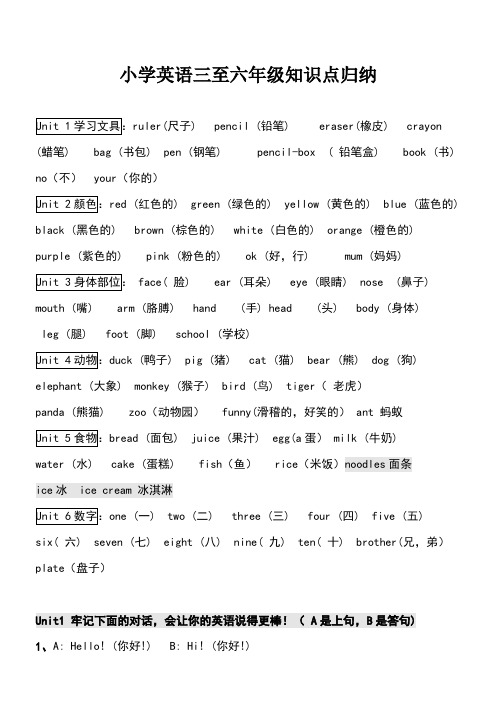
小学英语三至六年级知识点归纳ruler(尺子) pencil (铅笔) eraser(橡皮) crayon(蜡笔) bag (书包) pen (钢笔) pencil-box ( 铅笔盒) book (书) no(不) your(你的)red (红色的) green (绿色的) yellow (黄色的) blue (蓝色的) black (黑色的) brown (棕色的) white (白色的) orange (橙色的)purple (紫色的) pink (粉色的) ok (好,行) mum (妈妈)face( 脸) ear (耳朵) eye (眼睛) nose (鼻子)mouth (嘴) arm (胳膊) hand (手) head (头) body (身体)leg (腿) foot (脚) school (学校)duck (鸭子) pig (猪) cat (猫) bear (熊) dog (狗)elephant (大象) monkey (猴子) bird (鸟) tiger(老虎)panda (熊猫) zoo(动物园) funny(滑稽的,好笑的) ant 蚂蚁bread (面包) juice (果汁) egg(a蛋) milk (牛奶)water (水) cake (蛋糕) fish(鱼) rice(米饭)noodles面条ice冰 ice cream 冰淇淋one (一) two (二) three (三) four (四) five (五)six( 六) seven (七) eight (八) nine( 九) ten( 十) brother(兄,弟)plate(盘子)Unit1 牢记下面的对话,会让你的英语说得更棒!( A是上句,B是答句)1、A: Hello! (你好!) B: Hi! (你好!)2、A:What’s your name?你叫什么名字?B:My name’s Chen Jie.我的名字是陈洁。
三~六年级英语知识点总结

三~六年级英语知识点总结三年级英语知识点总结(人教版)一、字母。
1. 26个英文字母的大小写书写。
要注意字母的占格、笔画顺序等。
例如,大写字母A、E、F、H等占上两格;小写字母如a、c、e、m等占中间一格,而g、p、q、y 等占下两格等。
2. 字母的读音,元音字母(a, e, i, o, u)和辅音字母的发音区别。
元音字母在开音节和闭音节中的发音规则初步了解,如a在开音节中发[ei],在闭音节中发[æ]。
二、词汇。
1. 简单的文具类单词,如pen(钢笔)、pencil(铅笔)、ruler(尺子)、eraser(橡皮)、crayon(蜡笔)等。
2. 颜色类单词,red(红色)、blue(蓝色)、green(绿色)、yellow(黄色)、black(黑色)、white(白色)等。
3. 身体部位类单词,head(头)、face(脸)、nose(鼻子)、mouth(嘴)、eye(眼睛)、ear(耳朵)、arm(手臂)、hand(手)、leg(腿)、foot(脚)。
三、句型。
1. 介绍自己的句型:I'm...(I'm Chen Jie.)2. 询问对方名字的句型:What's your name?3. 表达自己有某物的句型:I have a...(I have a pen.)4. 描述颜色的句型:It's...(It's red.)四年级英语知识点总结(人教版)一、单词。
1. 数字类单词,从one到ten,以及eleven到twenty等,要掌握数字的拼写和读音。
2. 动物类单词,如cat(猫)、dog(狗)、pig(猪)、duck(鸭)、bear (熊)、elephant(大象)等。
3. 家庭成员类单词,father(父亲)、mother(母亲)、brother(兄弟)、sister(姐妹)、grandfather(祖父/外祖父)、grandmother(祖母/外祖母)等。
新人教版pep小学英语三至六年级知识点归纳
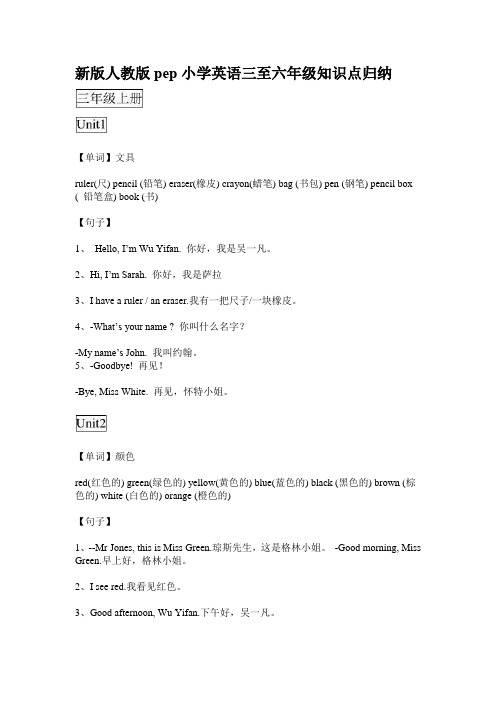
新版人教版pep小学英语三至六年级知识点归纳【单词】文具ruler(尺) pencil (铅笔) eraser(橡皮) crayon(蜡笔) bag (书包) pen (钢笔) pencil box ( 铅笔盒) book (书)【句子】1、Hello, I’m Wu Yifan. 你好,我是吴一凡。
2、Hi, I’m Sarah. 你好,我是萨拉3、I have a ruler / an eraser.我有一把尺子/一块橡皮。
4、-What’s your name ? 你叫什么名字?-My name’s John. 我叫约翰。
5、-Goodbye! 再见!-Bye, Miss White. 再见,怀特小姐。
【单词】颜色red(红色的) green(绿色的) yellow(黄色的) blue(蓝色的) black (黑色的) brown (棕色的) white (白色的) orange (橙色的)【句子】1、--Mr Jones, this is Miss Green.琼斯先生,这是格林小姐。
-Good morning, Miss Green.早上好,格林小姐。
2、I see red.我看见红色。
3、Good afternoon, Wu Yifan.下午好,吴一凡。
4、-Nice to meet you.见到你很高兴。
-Nice to meet you, too.见到你也很高兴。
5、Colour it brown!把它涂成棕色吧!【单词】身体部位face( 脸) ear (耳朵) eye (眼睛) nose(鼻子) mouth (嘴) arm (胳膊)hand(手) head (头) body (身体) leg (腿) foot (脚)【句子】1、--How are you?你好吗?--I’m fine, thank you.我很好,谢谢你。
--Let’s go to school!我们一起上学吧!2、Look at me !看我!3、Very well, thanks.很好,谢谢。
人教版英语3-6年级知识点总结

人教版英语3-6年级知识点总结三年级上册。
一、字母与单词。
1. 26个英文字母。
- 大写字母:A - Z;小写字母:a - z。
要求能够正确书写大小写字母,注意字母的占格、笔画顺序等。
- 例如:Aa, Bb, Cc等字母的大小写在四线三格中的写法。
2. 简单单词。
- 文具类:pen(钢笔)、pencil(铅笔)、ruler(尺子)、eraser(橡皮)、crayon(蜡笔)。
- 颜色类:red(红色)、blue(蓝色)、green(绿色)、yellow(黄色)、black(黑色)、white(白色)。
- 动物类:cat(猫)、dog(狗)、duck(鸭子)、pig(猪)、bear(熊)。
二、句型。
1. 自我介绍。
- I'm...(我是……)例如:I'm Mike.2. 询问物品。
- What's this?(这是什么?) It's a...(它是一个……)例如:What's this? It's a pen.3. 询问颜色。
- What color is it?(它是什么颜色的?) It's...(它是……颜色的)例如:What color is it? It's red.三年级下册。
一、单词。
1. 家庭成员。
- father(爸爸)、mother(妈妈)、brother(兄弟)、sister(姐妹)、grandfather(爷爷/外公)、grandmother(奶奶/外婆)。
2. 身体部位。
- head(头)、face(脸)、nose(鼻子)、mouth(嘴)、eye(眼睛)、ear (耳朵)、arm(手臂)、hand(手)、leg(腿)、foot(脚)。
3. 数字1 - 10。
- one、two、three、four、five、six、seven、eight、nine、ten。
二、句型。
1. 介绍家庭成员。
- This is my...(这是我的……)例如:This is my father.2. 描述身体部位。
(完整word版)新版人教版pep小学英语3至6年级知识点归纳.doc
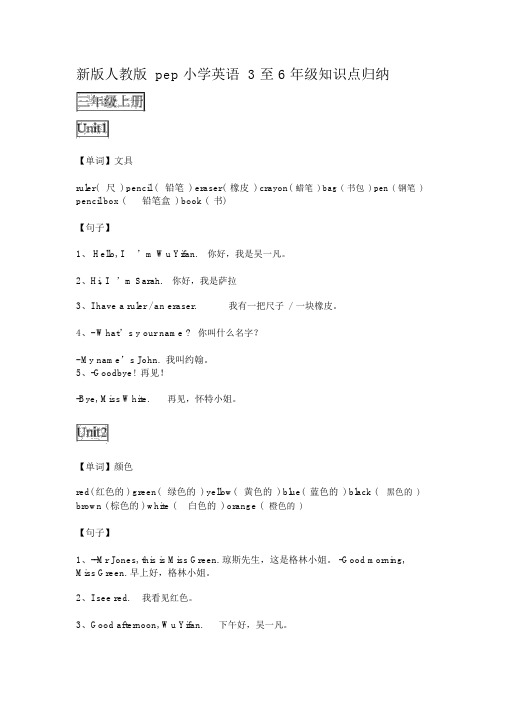
新版人教版 pep 小学英语 3 至 6 年级知识点归纳【单词】文具ruler(尺) pencil (铅笔) eraser(橡皮) crayon(蜡笔) bag (书包) pen (钢笔) pencil box (铅笔盒) book (书)【句子】1、 Hello, I’m Wu Yifan.你好,我是吴一凡。
2、Hi, I’m Sarah.你好,我是萨拉3、I have a ruler / an eraser.我有一把尺子/一块橡皮。
4、- What’s y our name ?你叫什么名字?-My name’s John. 我叫约翰。
5、-Goodbye! 再见!-Bye, Miss White.再见,怀特小姐。
【单词】颜色red( 红色的 ) green(绿色的) yellow(黄色的) blue(蓝色的) black (黑色的) brown ( 棕色的 ) white (白色的) orange (橙色的)【句子】1、--Mr Jones, this is Miss Green. 琼斯先生,这是格林小姐。
-Good morning, Miss Green. 早上好,格林小姐。
2、I see red.我看见红色。
3、Good afternoon, Wu Yifan.下午好,吴一凡。
4、-Nice to meet you.见到你很高兴。
-Nice to meet you, too.见到你也很高兴。
5、 Colour it brown!把它涂成棕色吧!【单词】身体部位face(脸) ear (耳朵) eye (眼睛) nose(鼻子) mouth (嘴) arm (胳膊)hand(手) head ( 头 ) body (身体) leg (腿) foot (脚)【句子】1、--How are you? 你好吗?-- I ’m fine, thank you. 我很好,谢谢你。
-- Let ’s go to school! 我们一起上学吧!2、 Look at me !看我!3、Very well, thanks.很好,谢谢。
三至六年级英语知识点归纳

三至六年级英语知识点归纳一、词汇与语法知识点1. 词汇的掌握:学生需要掌握基本的英语词汇,包括动词、名词、形容词、副词等,并能够正确运用在句子中。
2. 时态的使用:学生需要学会使用一般现在时、一般过去时和一般将来时等基本时态,并能够准确地运用在句子中。
3. 介词的运用:学生需要学会使用常见的介词,如in、on、at等,并能够准确地运用在句子中表达时间、地点等的含义。
4. 句型的构成:学生需要学会构造基本的句型,如肯定句、否定句、疑问句等,并能够根据具体的语境运用适当的句型表达自己的意思。
5. 数词的掌握:学生需要学会基本的数词,包括基数词、序数词等,并能够正确运用在句子中表达数量和顺序。
二、阅读与理解知识点1. 阅读理解:学生需要通过阅读短文、故事等来理解其中的内容,并能够回答相关的问题。
2. 阅读技巧:学生需要学会使用一些阅读技巧,如预测、猜测词义、找主题句等,以提高阅读理解能力。
3. 词义猜测:学生需要学会通过上下文推测词义,以理解句子或短文的意思。
4. 标点符号的理解:学生需要学会理解常见的标点符号的含义,如句号、问号、感叹号等,并能够根据标点符号来正确理解句子的意思。
5. 主题与细节:学生需要学会找出短文的主题,并能够提取出关键细节来支持自己的理解。
三、听力与口语知识点1. 听力理解:学生需要通过听力材料来理解其中的内容,并能够回答相关的问题。
2. 发音准确:学生需要学会正确地发音,并能够模仿录音中的语音。
3. 口语表达:学生需要学会用英语表达自己的想法、感受等,并能够流利地进行简单的对话。
4. 语音语调:学生需要学会正确地运用语音语调,使自己的语言更加自然地流畅。
5. 问答技巧:学生需要学会提出问题和回答问题的基本技巧,以增强与他人的交流能力。
四、写作知识点1. 书写规范:学生需要学会正确地书写字母和单词,并能够保持字迹工整。
2. 句子的组织:学生需要学会组织句子,使其表达清晰、连贯。
英语三到六年级知识点
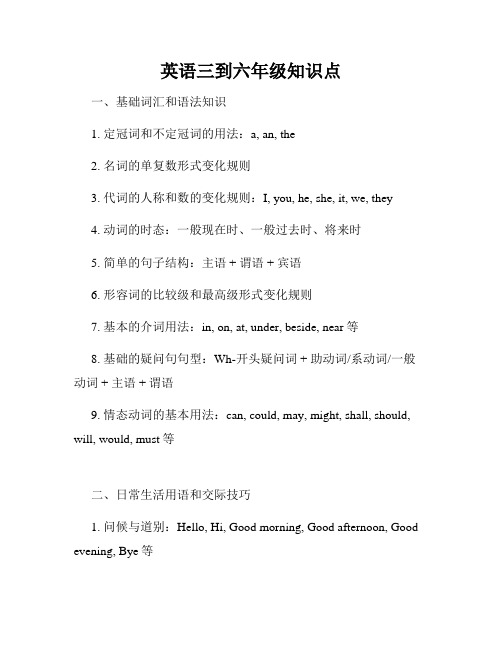
英语三到六年级知识点一、基础词汇和语法知识1. 定冠词和不定冠词的用法:a, an, the2. 名词的单复数形式变化规则3. 代词的人称和数的变化规则:I, you, he, she, it, we, they4. 动词的时态:一般现在时、一般过去时、将来时5. 简单的句子结构:主语 + 谓语 + 宾语6. 形容词的比较级和最高级形式变化规则7. 基本的介词用法:in, on, at, under, beside, near等8. 基础的疑问句句型:Wh-开头疑问词 + 助动词/系动词/一般动词 + 主语 + 谓语9. 情态动词的基本用法:can, could, may, might, shall, should, will, would, must等二、日常生活用语和交际技巧1. 问候与道别:Hello, Hi, Good morning, Good afternoon, Good evening, Bye等2. 自我介绍和简单的人际交往:What's your name? How old are you? Where are you from? Nice to meet you等3. 数字的读法和基本运用:1-100以内的数字4. 时间表达:What time is it? It's... o'clock.等5. 日期和星期的表达:What day is it? It's Monday.等6. 询问和表达日常活动:What are you doing? I'm reading.等7. 家庭成员的称呼和关系:father, mother, brother, sister等8. 询问和表达喜好和能力:What do you like? I like swimming.等9. 询问和表达学校和班级信息:What grade are you in? I'm in Grade 4.等三、基础阅读和写作技巧1. 理解简单的短文:根据短文内容回答问题2. 阅读理解:根据给定的段落回答问题或选择正确的答案3. 写作基础:描述人物、事物、描述日常活动、写作问候语等4. 基础的书信写作:写一封简单的问候信或感谢信四、常见的英语听力技巧1. 听懂简短的对话和问答:根据对话内容回答问题2. 听懂简单的讲解和说明:根据听到的内容选择正确答案3. 听懂简单的故事或短文:根据听到的内容回答问题或选择正确答案4. 听懂日常生活场景中的对话:例如购物、问路等五、常见的综合运用技能1. 根据所学知识点完成填空练习2. 根据所学知识点完成选择题练习3. 根据所给提示完成对话或句子4. 完成简单的阅读和写作任务以上是英语三到六年级的基础知识点和技巧,通过掌握这些内容,学生可以在学习和交流中更好地运用英语,提高听说读写的能力。
小学三至六年级英语知识点归纳总结

小学三至六年级英语知识点归纳总结三年级上册英语专题考点存在主要问题分值比例常见题型字母26个字母的大;小写和五个元音字母26个字母的正确发音与前后顺序的记忆。
5-8分填空题名词名词的单;复数形式不能正确写出可数名词的复数形式;如:tooth-teeth;mouse-mice.8-10分单词分类介词in;on;under等介词的用法对介词的用法掌握不透;导致使用错误。
3-5分选择题;看图选择正确的单词。
冠词a;an;the的用法在不定冠词的用法上会混淆;不理解“an”用于元音音素开头的名词前。
1-2分选择题特殊疑问词what; how;where; what colour;how many的用法在特殊疑问词的运用方面不够灵活。
3-5分选择题;按实际情况回答问题。
There be句型There is和there are的用法there are后面接名词复数;学生常常忽视。
2-4分选择题;按实际情况回答问题。
Be动词am;is ;are的正确运用不能随着人称的变化而变化;如:Are you tall?Yes;I am.are常忘了改成am.you常忘了改成I.3-5分选择题;填空题情景对话日常问候语中;差生对情景对话不够熟练;易失分。
5-8分选择正确的句子完成对话。
单词有关身体部分;学习文具;颜色;交通工具;数字的单词。
大部分学生对颜色;交通工具;数字的单词掌握不了。
8-10分单词分类;听力题;看图写单词句型有关用特殊疑问词如:what colour; howmany提问的句子;以及一般疑问句对特殊疑问句掌握不透;导致选择错误。
3-5分按实际情况回答问题听力重要单词;短语;句子。
听句子;把所缺的单词补充完整这种题型最易失分。
40-50分选择听到的内容;听句子;把所缺的单词补充完整。
三年级下册英语有关家庭成员的称呼husband;wife;brother;sister;uncle;aunt;son;daughter的记忆。
英语三至六年级总结知识点

英语三至六年级总结知识点英语作为一门重要的外语,对学生的英语能力有着至关重要的影响。
在小学三至六年级的学习过程中,学生们逐渐掌握了英语的基础知识和语言技能。
本文将对小学三至六年级英语的知识点进行总结,帮助同学们回顾和巩固所学内容。
一、语音知识在英语学习的早期阶段,学生们需要掌握英语的基本发音规则。
以下是英语语音知识的要点:1. 英语字母的发音:学生们需要熟悉英语字母表中每个字母的发音,并能准确拼读出单词的音节。
2. 元音和辅音:学生们需要区分元音和辅音的发音,掌握元音字母的发音规则。
3. 重音规则:学生们需要了解单词重音的规则,正确读出带重音的音节。
二、词汇知识在学习英语的过程中,积累词汇是非常重要的。
以下是小学三至六年级学生需要掌握的一些基本词汇:1. 常用动词:学生们需要掌握一些常用的动词,如"be"、"have"、"do"等,以及表示常见动作和状态的动词。
2. 名词、形容词和副词:学生们需要掌握一些常见的名词、形容词和副词,以扩展词汇量并丰富语言表达。
3. 日期、时间和数字:学生们需要掌握日期、时间和数字的英语表达方式,如月份、星期几等。
三、语法知识英语语法是学习英语的基础,以下是小学三至六年级学习的一些基本语法知识:1. 时态:学生们需要了解一般现在时、一般过去时和一般将来时等基本时态的构成和用法。
2. 人称代词:学生们需要掌握第一人称和第三人称的主格和宾格代词,并了解其在句子中的用法。
3. 句型转换:学生们需要学会进行简单句到复合句、肯定句到否定句以及陈述句到疑问句等的转换。
四、阅读理解阅读理解是英语学习中的重要部分,学生们需要通过阅读来理解和掌握英语表达的意思。
以下是小学三至六年级学生在阅读理解方面需要注意的知识点:1. 掌握常见的词汇和短语,以更好地理解上下文的意思。
2. 学会提取关键信息,理解文章的主题和大意。
3. 掌握不同类型问题的解答方法,如选择题、判断题和填空题等。
小学3-6年级英语知识点归纳

3-5分
听力题;单词分类。
有关问天气的用语
问天气的句型和形容天气的词汇。
不能区分形容天气的词汇,如:windy,cloudy,rainy.
2-3分
选择题;看图写单词。
短语
each other,be
worried about,
do well in,have to等短语的灵活运用。
2-3分
选择题;单词分类;看图写单词。
有关公共场所的名称
building,headmaster’s office,
library,playground,teachers’
room的区分。
对单词记忆不牢,难以区分各公共场合的名称。
2-3分
选择题;听力题;看图写单词;单词分类。
名词的所有格
名词单数与复数的所有格形式。
近义词
too,also,
either,still,yet的用法。
学生对also和either,
still和yet的用法会混淆。
1-2分
选择题。
冠词
a,an,the的用法。
在乐器前常忘了使用定冠词the,如:play the guitar.
1-2分
选择题。
名词的所有格
名词的所有格形式。
对无生命的名词所有格掌握不透,如:the pupils of Class One,a setter of a world record.
对特殊疑问句掌握不透,导致选择错误。
3-5分
按实际情况回答问题
听力
重要单词,短语,句子。
听句子,把所缺的单词补充完整这种题型最易失分。
40-50分
选择听到的内容;听句子,把所缺的单词补充完整。
小学三至六年级英语知识点归纳
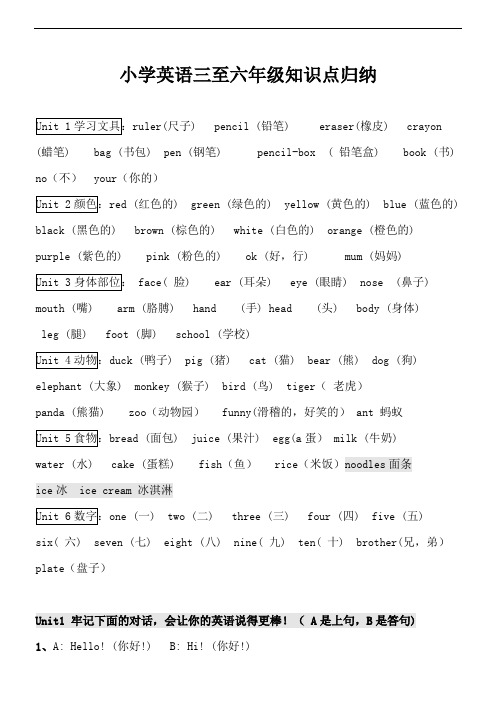
小学英语三至六年级知识点归纳ruler(尺子) pencil (铅笔) eraser(橡皮) crayon(蜡笔) bag (书包) pen (钢笔) pencil-box ( 铅笔盒) book (书) no(不) your(你的)red (红色的) green (绿色的) yellow (黄色的) blue (蓝色的) black (黑色的) brown (棕色的) white (白色的) orange (橙色的)purple (紫色的) pink (粉色的) ok (好,行) mum (妈妈)face( 脸) ear (耳朵) eye (眼睛) nose (鼻子)mouth (嘴) arm (胳膊) hand (手) head (头) body (身体)leg (腿) foot (脚) school (学校)duck (鸭子) pig (猪) cat (猫) bear (熊) dog (狗)elephant (大象) monkey (猴子) bird (鸟) tiger(老虎)panda (熊猫) zoo(动物园) funny(滑稽的,好笑的) ant 蚂蚁bread (面包) juice (果汁) egg(a蛋) milk (牛奶)water (水) cake (蛋糕) fish(鱼) rice(米饭)noodles面条ice冰 ice cream 冰淇淋one (一) two (二) three (三) four (四) five (五)six( 六) seven (七) eight (八) nine( 九) ten( 十) brother(兄,弟)plate(盘子)Unit1 牢记下面的对话,会让你的英语说得更棒!( A是上句,B是答句)1、A: Hello! (你好!) B: Hi! (你好!)2、A:What’s your name?你叫什么名字?B:My name’s Chen Jie.我的名字是陈洁。
三至六年级英语必背知识点

一、基础语法1.一般现在时:表示经常性的、习惯性的或真理性的动作或状态。
2.一般过去时:表示过去一些时间发生的动作或存在的状态。
3. 表达过去习惯的方式:used to + 动词原形。
4.现在进行时:表示现在正在进行的动作,常与现在时间状语连用。
5. 情态动词can/could:表示能力、许可或请求。
6. 情态动词should/shouldn't:表示建议或劝告。
7.数词的表达方式:基数词和序数词的用法。
8.比较级和最高级的形式及用法:形容词和副词的比较级和最高级的构成和用法。
9. 定冠词和不定冠词的用法:the、a/an的用法。
10.名词单复数的形式及用法:不规则名词的复数形式。
二、日常用语1. 问候和道别的常用表达:例如Hello, Hi, Good morning, Goodbye, Bye等。
2. 自我介绍和介绍他人的常用表达:例如My name is…, I am…, This is…等。
3. 家庭和亲属的称呼:例如father, mother, sister, brother, grandparents等。
4. 日常生活中常用的动词和词组:例如eat, drink, sleep, get up, go to school, do homework等。
5. 表述喜欢和不喜欢的表达方式:例如I like…, I don't like…,I love…等。
6. 询问和表达年龄的句型:例如How old are you?, I am… years old等。
7. 询问和表达兴趣爱好的句型:例如What do you like to do?, I like…等。
9. 表述天气的常用句型:例如What's the weather like today?,It's sunny, rainy, cloudy等。
10. 询问和表达方向的句型:例如Excuse me, How can I get to…?, Go straight, Turn left/right等。
(完整版)三至六年级英语语法知识汇总

(完整版)三⾄六年级英语语法知识汇总三⾄六年级英语语法知识汇总⼀、词类:1、动词:⾏为动词、be动词、情态动词。
(1)⾏为动词原形、+s/es、+ed、+ing,具体判断⽅法如下:(2)be动词a、Am--was Is --was Are--were ⼝诀:我⽤am, 你⽤are, is⽤在他她它,所有复数全⽤are。
b、肯定和否定句I am (not) from London. He /She is(not) a teacher. My hair is(not) long. Her eyes are(not) small.c、⼀般疑问句Am I …? Yes, you are. No, you aren’t. Are you/they…? Yes,we/ they are. No,we/ they aren’t. Is the cat fat? Yes, it is. No, it isn’t.is、am、are为⼀类,⼀般⽤于⼀般现在时、现在进⾏时和⼀般将来时中。
was和were为另⼀类,⼀般⽤于⼀般过去时。
(3)情态动词can、must、should、would、may。
情态动词后动词总是⽤原形。
(不受其他任何条件影响)2、名词这⾥强调两点:不可数名词都默认为单数,所以总是⽤is或者was。
如何加后缀:a.⼀般情况下,直接加-s,如:book-books, bag-bags, cat-cats, bed-bedsb.以s. x. sh. ch结尾,加-es,如:bus-buses, box-boxes, brush-brushes, watch-watchesc.以“辅⾳字母+y”结尾,变y为i, 再加-es,如:family-families, strawberry-strawberriesd.以“f或fe”结尾,变f或fe为v, 再加-es,如:knife-knivese.不规则名词复数: man-men, woman-women, policeman-policemen, policewoman-policewomen, mouse-mice child-children foot-feet ,.tooth-teeth fish-fish, people-people, Chinese-Chinese, Japanese-Japanese3、形容词(包括副词)形容词表⽰某⼀事物或的特征,副词表⽰某⼀动作的特征。
PEP小学小学三年级的到小学六年级的英语学习知识点归纳精版本.docx

PEP小学英语三到六年级知识点归纳三年级上册知识点归纳单词Unit 1:pen (钢笔)pencil (铅笔)pencil-case(铅笔盒 )ruler(尺子) eraser(橡皮)crayon (蜡笔) book (书) bag (书包) sharpener (卷笔刀) school (学校)Unit 2: head( 头 ) face(脸)nose ( 鼻子 ) mouth ( 嘴 )eye ( 眼睛 ) leg (腿) ear (耳朵)arm ( 胳膊 ) finger (手指)foot (脚)body ( 身体 )Unit 3 : red (红色的) yellow (黄色的)green ( 绿色的 ) blue (蓝色的) purple (紫色的)white (白色的) black (黑色的) orange (橙色的) pink (粉色的) brown ( 棕色的 )Unit 4: cat ( 猫) dog ( 狗 ) monkey ( 猴子 ) panda ( 熊猫 ) rabbit(兔子) duck ( 鸭子 ) pig ( 猪)bird (鸟) bear (熊)elephant (大象)mouse ( 老鼠 ) squirrel (松鼠)Unit 5 : cake ( 蛋糕 ) bread ( 面包 ) hot dog (热狗) hamburger (汉堡包) chicken (鸡肉) tea (茶)French fries (炸薯条)coke ( 可乐 ) juice (果汁)milk ( 牛奶 )water (水)coffee (咖啡)Unit 6:one (一) two (二)three (三)four (四) five (五) six( 六 ) seven ( 七 ) eight (八) nine(九)ten( 十 )doll (玩具娃娃)boat (小船)ball (球) kite ( 风筝 ) balloon (气球) car (小汽车)plane (飞机)句子1、向别人问好应该说―― A: Hello! (你好!)B:Hi! (你好!)2、问别人的名字应该说――A:What’s your name ?你的名字是什么?B:My name’s Chen Jie.我的名字是陈洁。
小学三 六年级英语知识点

小学三六年级英语知识点小学三六年级英语知识点一、基础语法知识点1. 时态在英语句子中,时态是表示动作发生的时间的形式。
在小学三六年级的英语中,主要学习以下几个时态:- 现在时:用来表示现在正在进行的动作或经常发生的动作。
例如:"I play football every Sunday."、"He is eating an apple now."- 过去时:用来表示发生在过去的动作或状态。
例如:"We went to the zoo yesterday."、"She studied for two hours last night."- 将来时:用来表示将来要发生的动作或计划。
例如:"I will visit my grandparents next week."、"They are going to have a picnic in the park tomorrow."2. 名词名词是用来表示人、事物、地方或想象的东西的词语。
在小学三六年级的英语中,需要掌握以下名词的基本用法:- 单数名词:表示一个人、一个物品、一个地方等。
例如:"a book"、"a cat"、"a park"- 复数名词:表示多个人、多个物品、多个地方等。
例如:"books"、"cats"、"parks"- 物主代词:表示所属关系,比如"my book"、"his car"、"our school"3. 动词动词是表示动作或状态的词语。
在小学三六年级的英语中,需要了解以下几种动词的使用方法:- 不规则动词:这些动词的过去式和过去分词不是通过在词尾加上-ed来变化,需要记住不规则变化的形式。
- 1、下载文档前请自行甄别文档内容的完整性,平台不提供额外的编辑、内容补充、找答案等附加服务。
- 2、"仅部分预览"的文档,不可在线预览部分如存在完整性等问题,可反馈申请退款(可完整预览的文档不适用该条件!)。
- 3、如文档侵犯您的权益,请联系客服反馈,我们会尽快为您处理(人工客服工作时间:9:00-18:30)。
Unit1
new,teacher,nice,meet,you,
nice to meet you
Unit2
good,how,are,you,How are you?fine,And you?OK Morning,children,thank,afternoon,thanks,Mrs,evening
知识点
letters
交际用语
1,hi/hello
句型
2,How are you? I’m fine/ok
3,Nice to meet you
4,Good morning/afternoon/evening
5,I’m/My name’s …
6,This is …
7,Thank you/Thanks
8,And you?
四年级英语上册 MODLUE1clothes 衣服
能力 1,了解如何用英语表达衣服
目标 2.能够谈论衣服和询问你想买的衣服的价钱
四会 Shop,morning,can,help,I’d like=I would like,buy,blouse,
How much,ninety,yuan,I’ll take it.pair,a,pair of,shoe,shirt,
三会 hero,heroine,hard-working,patient,hand-some,movie,star,hon est,parent,feed,round,ugly,weak
句型 知识 1,She’s wearing a pair of black shoes. 点 2,The woman is very thin 3,Who’s your hero? 4,She’s kind and hard-working 交际 1,You mean the short boy? 用语 2,Wow
3. Clour the..
4. What’s this/that/it in English?
5. It’s..
交际 用语
1. let’s.. 2. I don’t know 3. That’s good 4. Right./That’s right
MODULE5 Transport 能力 1,能够用英语表达交通工具 目标 2.能够用英语询问关于交通工具的问题
4,How much are the trousers?They’re 40yuan pounds.
1,how many 与 how much 的区别
2,基数词
3,辨析 All right 与 That’s all right
All right”做对方建议或劝告的应答语
You’d better not somke
--All right.
(2)做对方想法和请求的应答语
Can I put my bag here?
4,A,B,C,D 在单词中的发音 5 名词所有格的构成 6,there be 句型简介 7,现在进行时特殊疑问句的构成。 9,询问某物是谁及其答语 Whose+名词+is it /are they?
MODLUE2peolpe 人物
三会 Pencil-case,pencil,sharpener
目标 Unit8 四会 open,book,please,me,here,’s=here is ,is,thank ,that’s=that is
yes
三会 pack,oh,lend,dear
句型 知识 1,where’s..? 如何询问某物在哪里
w.
Unit11 四会 Draw,let,us,let’s=let us,now,like,apple,cake,white,car,black,
Brown,grey,ball
三会 Paper,use,cloured,girl,lip
句型 知识 1. what colour is the…?
点 2. Draw a/an..
点 2.Is this 询问目标问是不是某物的句型
交际 Hurray
用语
MODULE6 Numbers and shapes.
能力 1,能够从一数到十五 目标 2.能够提问并回答关于有多少东西和东西是什么形状的问题
四会 They,ther’re=they are,these,an,ha-ha
知识 Unit16 Unit17
三会 clothes,assistant,shop assitant,jeans,trousers,sweater,jacket
Unit2 四会 Afternnoon,for,pound,whose
三会 Sir,bye,madam
句型 知识 1,Whose is the coat?It’s John’s
1,want 的用法
2,如何询问别人的情况
What about?
3,辨析 job 与 work
都指”工作”look for job=look for work
Job 指有报酬的工作是可数名词
Work 泛指工作,劳动,指人们是常生活和工作中从事的体力或脑力劳动,不可
数名词,前面不能加定冠词
3,here you are
4,That’s ok
5.Oh dear
Module4 colours 颜色
能力 1,能够谈论物品的颜色
目标 2 能够说出颜色的名称
3 能够听指令并给图片涂颜色
四会 Look,what,what’s=what’s it’s=it is ,sun,I,english,in
english,a
知识 Unit10
Picture,of,a picture of,colour,red,blue,right,That’s
right,green,orange,yellow,pink,purple
目标
三会 There,over,there,know,do,don’t=do not,I don’t know,rainbo
点 如何询问对方长大想做什么事情?
What do you want to be when you grow up?
I want to be a teahcer
交际 What’s the lady’s job?She’s a fa do ?He’s a policeman.
目标
句型
三会 四会
三会 知识 点
交际 用语
Shape,circle,triangle,square,rectangle
Many,how many,there are,four,one,two,three,five,six,seven, Eight,nine,ten,eleven,twleve,thirteen,fourteen,fifteen, There is Figer,thumb,line 1,what shape is this?It’s.. 2,What shape are they?They’re.. 3,What are thery?They’re 4,How many..are there?There is … There are 5,What’s …and…? 1. Good 2. Very good 3. Ha-ha
三会 grow,grow up,postman,postmen,bank,manager,fireman,firem
目标
en
三会 Cleaner,athlete,waiter,waitress,lawyer,clerk,bank clerk.
句型 知识 What do you lady’s job?She’s a farmer./
能力 目标
知识 目标
1,能够描写你的朋友 2.了解描写人物的单词
四会 Cap,hat,wear,be(is/are)wearin,friend,blonde,thin,heavy,youn g
Unit4 三会 mean
Unit5 四会 Today,talk,about,talk about,kind,funny,both,great,cook,well,t rue,friendly
点 2,whose are the long socks?They’re my sister’s
交际 1,Can I help you,sir/madam./what can I do for you?
用语 2,I’d like to buy a pair of shoes
3,How much is the T-shirt?It’s 20yuan.
Unit5 四会 Arm,leg,this,is ,that,my,foot,
目标
三会 touch,toe,raise,right,left,ouch.body
句型 知识 1,This is …
点 2,That’s..
交际 OK./All right
用语
祈使句型的回答,初识祈使句
Moudle3
能力 1,能够听懂口令并作动作
目标 2 知道课堂上所需要的物品
3 能够告诉别人物品在哪儿
四会 Where,where’s=where
is ,pencil,it,on,desk,no,bed,not,isn’t=i
知识 Unit7
s not ,in ,table,here,pen,chair,box,rubber,ruler,bag,the,
Module2.My body
能力 1,能够用英语说出身体部位
目标 2 能用英语给出指
四会 Your ,hand,Mr,hair,face,and,ear,Mrs.but,eye,head,nose,
mouth
知识 Unit4 三会 wash,brush,all,right,Allright,dad,clean,mum,teeth,draw
